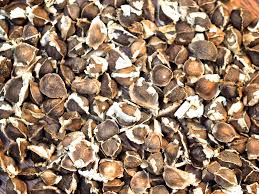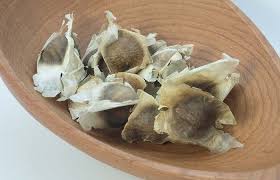Moringa seeds are the seeds of the Moringa oleifera tree, a fast-growing, drought-resistant tree native to parts of South Asia and Africa. The Moringa tree is often referred to as the “miracle tree” due to its various medicinal, nutritional, and industrial uses. Moringa seeds are round or oval-shaped, typically about the size of a large pea or a small peanut. They measure approximately 1 to 1.5 centimeters (0.4 to 0.6 inches) in diameter. The seeds are usually dark brown or black in color with a hard and smooth outer shell.
The outer shell of Moringa seeds is tough and provides protection to the inner seed. Once the outer shell is cracked open, the inner part of the seed is revealed, which is soft and cream-colored. Moringa seeds are highly nutritious and are a good source of various essential nutrients, including vitamins, minerals, protein, healthy fats, and antioxidants. They contain essential amino acids, vitamin C, vitamin A, potassium, calcium, iron, and more.
Moringa seeds have a mild, slightly nutty flavor, making them versatile for use in both savory and sweet dishes. The taste is often compared to a combination of green peas and sunflower seeds. Moringa seeds are known for their medicinal properties and have been used in traditional medicine for centuries. They are believed to have anti-inflammatory, anti-diabetic, and anti-bacterial properties. Additionally, they may support digestion, improve cardiovascular health, and boost the immune system.
Moringa seeds are used in cooking and can be consumed in various ways. They can be eaten raw, roasted, or included in soups, stews, curries, and stir-fries. The seeds can also be ground into a powder and used as an ingredient in smoothies, baked goods, and sauces.
Moringa seeds are a rich source of oil, known as Moringa oil or Ben oil. This oil is clear, odorless, and has a mild taste. It is commonly used in cooking, as a moisturizer in skincare products, and in traditional medicine. Moringa trees are environmentally friendly as they require minimal water and grow rapidly, making them a sustainable source of nutrition and various products.
The Economic Importance and Uses of Moringa Seeds

Moringa seeds are derived from the Moringa oleifera tree, also known as the “miracle tree” or “drumstick tree.” The seeds have various economic importance and uses due to their nutritional, medicinal, industrial, and agricultural properties.
Here’s a comprehensive list of economic importance and uses of Moringa seeds:
1. Nutritional Supplement: Moringa seeds are rich in essential nutrients, including proteins, vitamins, minerals (such as calcium, iron, and magnesium), and healthy fats. They serve as a valuable nutritional supplement, especially in regions where malnutrition is prevalent.
2. Edible Oil Production: Moringa seeds can be pressed to extract a high-quality, nutritious edible oil. This oil is light, non-drying, and has a high smoke point, making it suitable for cooking, frying, and as a salad dressing.
3. Cosmetics and Personal Care Products: Moringa oil is used in the cosmetic and personal care industry to produce skincare products like moisturizers, lotions, and hair care products. It is known for its moisturizing and nourishing properties.
4. Pharmaceutical Industry: Moringa seeds contain compounds with potential medicinal properties. Extracts from Moringa seeds are used in the production of various pharmaceuticals, including anti-inflammatory, antimicrobial, and anti-cancer drugs.
5. Water Purification: Moringa seeds have natural coagulant properties, making them useful in water purification processes. They can help clarify and purify water by binding to impurities and making them settle, facilitating easier removal.
6. Agricultural Applications: Moringa seeds can enhance soil fertility due to their high nutrient content. They can be used as organic fertilizers or incorporated into compost to enrich the soil and promote plant growth.
7. Animal Feed and Fodder: Moringa seeds, as well as the seed cake (the byproduct of oil extraction), are utilized as animal feed and fodder. They provide essential nutrients for livestock and poultry, promoting better growth and health.
8. Biodiesel Production: The oil extracted from Moringa seeds can be used as a feedstock for biodiesel production. Biodiesel derived from Moringa oil is a sustainable and eco-friendly alternative to conventional fossil fuels.
9. Traditional Medicine: In traditional medicine, Moringa seeds have been used to treat various ailments, including digestive disorders, hypertension, joint pain, and as an immune system booster. They are also believed to have anti-parasitic and anti-diabetic properties.
10. Seed Powder for Food and Beverage Industry: Moringa seed powder can be used as an ingredient in food products, beverages, and nutritional supplements, adding nutritional value and health benefits.
11. Soil Erosion Control: Moringa seeds can aid in soil erosion control by stabilizing soil and preventing erosion, making them valuable in land restoration and conservation efforts.
Read Also: Organic Foods and Organic Standards Guide
12. Bioprospecting and Research: Researchers and scientists study Moringa seeds for potential new applications and benefits, leading to further discoveries and advancements in various fields.
The Products and By-products That Can Be Derived From Moringa Seeds

Moringa seeds, obtained from the Moringa oleifera tree, are known for their various potential uses and by-products.
Here’s a list of products and by-products that can be derived from Moringa seeds along with brief explanations for each:
1. Moringa Seed Oil: Moringa seed oil, also known as Ben oil or Behen oil, is a valuable product extracted from the seeds. It’s rich in oleic acid and can be used for cooking, cosmetics, skincare, hair care, and medicinal purposes.
2. Moringa Seed Cake: After extracting oil from the seeds, the remaining seed cake can be used as a valuable by-product. Moringa seed cake is rich in protein and can be used as a fertilizer or livestock feed.
3. Moringa Protein Powder: Moringa seeds contain a significant amount of protein. The seeds can be ground into a fine powder to create a protein-rich supplement that can be added to smoothies, shakes, or food.
4. Moringa Leaf Powder: While not a direct by-product of the seeds, Moringa leaves are commonly used to make a nutritious powder. However, seeds can also be ground and combined with the leaves to create a more diverse nutritional supplement.
5. Moringa Tea: Ground Moringa seeds can be used to make Moringa tea, which is known for its potential health benefits and nutritional value.
6. Moringa Seed Extract: Moringa seeds can be used to create various extracts with potential medicinal properties, often used in traditional medicine for their reported anti-inflammatory, antioxidant, and anti-bacterial properties.
7. Moringa Seed Flour: Ground Moringa seeds can be used to produce flour, which can be used in baking to enhance the nutritional content of bread, pastries, and other baked goods.
8. Moringa Seed Capsules: Ground Moringa seeds can be encapsulated to create dietary supplements in the form of capsules, making it convenient for consumption.
9. Moringa Seed Soap: Moringa seed oil is used to make soap, providing a natural and nourishing option for skincare routines.
10. Moringa Seed Water Purification: Moringa seeds contain proteins that can coagulate impurities in water, aiding in water purification by removing suspended particles and making the water safer for consumption.
11. Moringa Seed Gum: The seeds can be used to extract a gum-like substance, which has potential applications in the food and pharmaceutical industries.
12. Moringa Seed Pesticide: Moringa seeds can be used to create a natural pesticide due to their insecticidal properties, providing an eco-friendly alternative for pest control in agriculture.
In conclusion, these products and by-products derived from Moringa seeds showcase the versatile nature of this plant and its potential applications in various industries, including food, health, agriculture, and cosmetics.

